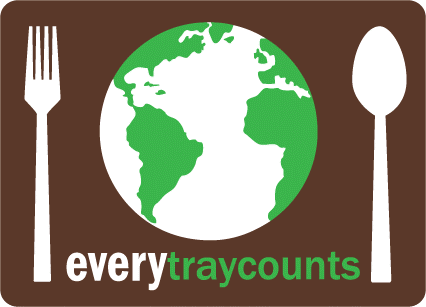Our approach to improving sustainability in our public schools is unique in several ways.
Trays/Food Waste. We aim to replace polystyrene trays used by students using the free and reduced lunch program to reusable or compostable trays. This effort eliminates the known leaching of styrene into hot foods served on polystyrene trays and reduces the landfill waste from the trays. Concurrently, we train the students and staff how to implement a compost program in the school. This requires a daily approach to service in the lunchroom and education of all students and faculty. When switching to compostable trays, we advocate adding them to food waste, further reducing the landfill amounts. ETC is also helpful in creating or improving recycling in the school, if asked.
Savings. ETC gives the school a way to measure food waste diversion, thereby showing all involved the savings and sustainability possibilities. This information is then publicized as a way to encourage the reexamination of solid waste contracts, trash amounts, and educational opportunities both in the school and the community. We help the school bring this pilot program to the entire district, as well as the interested community. ETC brings together the work of the school system with the solid waste departments of each county or district.
Data. The pilot program in schools is designed to provide data to the school district so that they can increase sustainability in their schools. It is also to demonstrate that using a compost line in the lunch room is not added work, but different work- therefore it is possible. Every Tray Counts aims to gather information regarding the quantity of waste generated in school cafeterias and obtain an understanding of how this waste is managed both at the school and after it is hauled away.
Toolkit. After introducing this concept in North Carolina, we have been asked to develop what we are calling a “toolkit”. We recognize that not all schools can go the same distance, in the same time period, and in the same way. We will be developing a “toolkit” to educate people that waste diversion and education are integrated. Toolkits will provide a road map for any group, parent, school, or community to explore issues of food waste, composting, tray options, and recycling in the school lunchroom. Tapping into expertise from schools, local government representatives, environmental groups, PTA, environmental heroes, and other organizations, the toolkit will be specific to NC schools. Each school district or community doesn’t always have the same barriers or opportunities; a toolkit provides options. Barriers commonly include lack of information, lack of coordination among schools, varying waste diversion capabilities within a town, city, or county and private waste hauling businesses, and others. Opportunities include savings from trash contracts and savings from buying sustainable products in bulk. This will also connect all interested schools in North Carolina to each other.
We document the amount of food waste generated in NC schools. Our next logical step is to create the toolkit, which will provide any school district a way to approach this issue using their own restrictions and opportunities as their baseline. Every Tray Counts will be a vital consultant, by providing instructions on how to get started and visiting the school when asked. The toolkit will identify specific policies and initiatives to minimize waste generation and maximize sustainability for schools across North Carolina. Both our availability as a resource at a school and our resource as a toolkit both sustains and furthers Every Tray Counts mission.
Goals: Our involvement in school districts and the development of a toolkit brings both heightened awareness and implementable action in reducing waste diversion in schools. Knowing this data will help guide policy and future initiatives to minimize waste generation and maximize sustainability for schools across the nation. One goal is to create permanent relationships as well, like the public/ private partnership between Oval Park Grille in Durham and E.K.Powe Elementary School in Durham. This partnership was initiated by ETC and others, but is now coordinated between Oval Park Grille and E.K.Powe’s PTA.
Another goal is to create a relationship between the compost facility, haulers, and the school. For example, Brooks Composting receives the food waste from the school, and will return it as compost when asked. This both shows the students how the food waste is transformed into nutrient-rich soil, and offers Brooks Composting a way to teach children about composting.
Overall, we have seen that the introduction of a conversation about what is being offered in a public school lunch room ignites curiosity, and then action, from the community as well as the parents. Once this action is started, many others begin to learn about composting and bring new ideas and problem-solving into their schools. It creates an atmosphere of working together.
Long-term success is sustained by reducing tonnage going to landfills, closing the waste to use cycle by turning current waste products into usable material (compost), and instilling student awareness and life-long interest in minimizing negative environmental impact.
Our goals reflect our unique approach:
Education: Ingrain “reduce, reuse, recycle, compost” concepts in North Carolina schools.
Trays: Remove polystyrene trays from school cafeterias.
Compost: Engage community and governmental agencies to divert waste from landfills.
